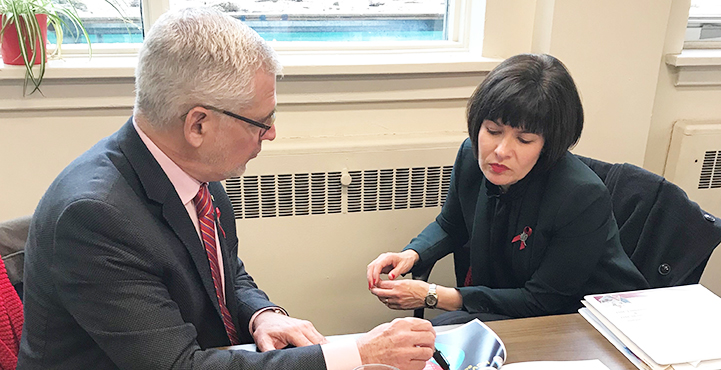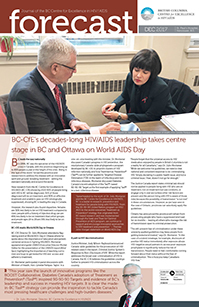
BC leads the way nationally
In 1996, BC was the epicenter of the HIV/AIDS crisis in Canada, with the province diagnosing up to 800 people a year at the height of the crisis. Being in the ‘eye of the storm’ forced the province and researchers to address the disease with an innovative spirit and ground-breaking treatment – setting the standard nationally and around the world.
New research from the BC Centre for Excellence in HIV/AIDS (BC-CfE) shows by 2020 90% of people living with HIV in BC will be diagnosed, 91% of those diagnosed will be on treatment, and 90% on effective treatment and unable to pass on HIV (virologically suppressed), showing BC is leading the way in Canada.
However, the research also found disparities: females are 30% less likely to be on HIV treatment compared to men; people with a history of injection drug use are 49% less likely to be on treatment than other groups; and people ages 18 to 29 are 35% less likely to be on treatment.
BC-CfE marks World AIDS Day in Ottawa
BC-CfE Director Dr. Julio Montaner attended a flag-raising event at World AIDS Day in Ottawa where he spoke about the importance of education and patient-centered services in fighting HIV/AIDS. Montaner appeared alongside UNAIDS Executive Director Michel Sidibe for the presentation of the UNAIDS report Blind Spot, highlighting the importance of reaching out to men and boys to get tested for HIV and access and adhere to treatment.
Dr. Montaner participated in panel discussions with Minister of Health, Hon. Ginette Petitpas-Taylor. In a one-on-one meeting with the minister, Dr. Montaner discussed Canada’s progress in HIV prevention, the revolutionary Canada-wide phylogenetics program developed by BC-CfE to pinpoint clusters of HIV infection nationally and how Treatment as Prevention® (TasP®) can be further applied to Targeted Disease Elimination (TDE) in the realm of infectious and non-infectious diseases. Montaner discussed Diabetes Canada’s recent adoption of the TasP®-based 90-90-90 Target as the first example of applying TasP® to a non-infectious disease.
A path to HIV decriminalization
Justice Minister, Judy Wilson-Raybould announced Canada-wide guidelines for the prosecution of HIV-related cases in the report, Criminal Justice System’s Response to Non-Disclosure of HIV. While the report addresses the broad over-criminalization of HIV in Canada, the BC-CfE believes the guidelines could go further to prevent HIV criminalization across the country.
“People forget that the universal access to HIV medication enjoyed by people in British Columbia is not a reality for all Canadians,” says Dr. Julio Montaner. “While we welcome the guidelines, we need a clear, national and consistent response to de-criminalizing HIV. Simply declaring it a public health issue, and not a criminal issue, I fear, doesn’t not go far enough.”
The Justice Canada report states criminal law should not be applied to people living with HIV who are on treatment, not on treatment but use condoms, or engage only in oral sex (unless other risk factors are present and the person living with HIV is aware of those risks) because the possibility of transmission “is not met” in these circumstances. However, as we have seen in the case of Ontario, provinces can selectively apply the guidelines.
Ontario has announced the province will refrain from prosecuting people who have a suppressed viral load for six months – leaving all others who manage the risk of transmission open to criminal prosecution.
“The still-present fear of criminalization under these unevenly applied guidelines may keep people from getting tested and treated,” says Dr. Montaner. “In the case of condom breakage, for example, disclosure of positive HIV status immediately after exposure allows HIV-negative sexual partners to access post-exposure prophylaxis to significantly reduce the risk of transmission. People need to feel comfortable coming forward about their status without the fear of criminalization. This is how you keep Canadians HIV-free.”

